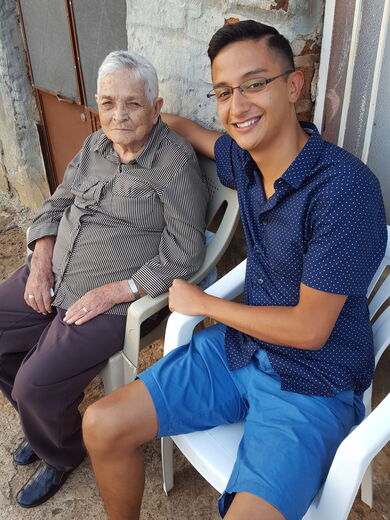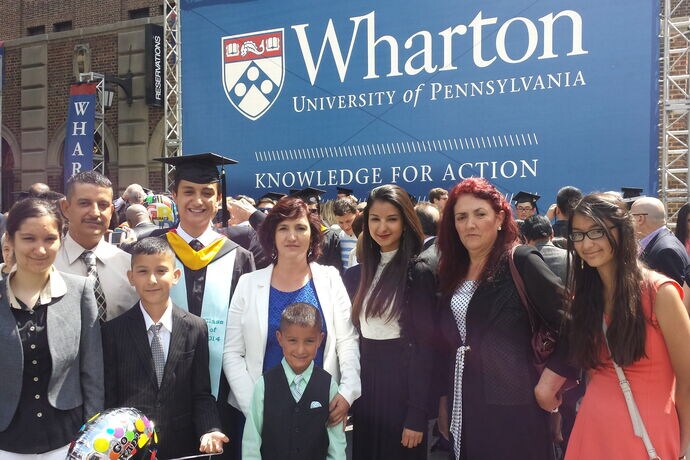DACA Changed My Life–But Undocumented Youth Deserve More

July 7, 2022
On a cold January morning in 2013, I walked down to my college dorm’s mailroom to pick up a credit card-sized piece of plastic that would change my life forever.
It instantly expanded my access to opportunity in America. My Deferred Action for Childhood Arrivals petition had been approved. At the time, I did not fully grasp what having that card would come to mean to me, to my family, and to hundreds of thousands of undocumented immigrants across the country.
Holding that card in my hand, I felt some relief from the uncertainty and anxiety that had defined my life—even as a child.
By the time I was eight, I knew the power that elected officials held over my family’s future. The 2000 presidential election was the first time I pinned my hopes on a presidential campaign. I vividly remember following both parties’ campaigns, telling myself, “The next president is going to give me and my family papers.” That’s the level of political consciousness many undocumented children have.
“Indeed, our everyday lives were shaped by fear. We did not leave the house after dark on weekends or visit family on holidays because even a routine traffic stop could lead to my family’s separation.”
In 2001, when I was 9 years old, I again had reason for hope. The first bipartisan iteration of the DREAM Act—federal legislation that would permanently protect certain immigrants who came to the United States as children—was introduced in the Senate. I had no idea I would wait in vain for it to pass for my entire life. That same year, I lost my grandfather to cancer in Mexico and witnessed my mother tailspin into a crippling, years-long depression. She decided not to go to Mexico to see him on his deathbed because of the risk of being permanently separated from her own children. That was just one of many painful decisions my parents made over the years.

Indeed, our everyday lives were shaped by fear. We did not leave the house after dark on weekends or visit family on holidays because even a routine traffic stop could lead to my family’s separation. By the time I reached high school, fear, shame, and anxiety was ever-present. Images in the media of workplace immigration raids, undocumented parents being detained outside of schools, and family separations were constant reminders that my family was not safe. I was not safe.
I was so afraid of my immigration status being discovered, that once it was time to apply to college in 2009, I avoided seeking help. I navigated higher education’s complex processes and systems without the assistance of any mentors, teachers, or guidance counselors. For months, I researched how I could go to school as an undocumented student, eventually stumbling on anonymous undocumented student message boards that listed schools where other undocumented students were enrolled and funded. I ultimately attended the most expensive program that accepted me–3,000 miles away from my California home at the University of Pennsylvania’s Wharton School. The school admitted me AND fully funded my education regardless of my immigration status.

On December 8, 2010–I remember the day–the U.S. House of Representatives passed the DREAM Act for the first time in the final days of the lame-duck session, nearly ten years after it was first introduced. The bill, known formally as the Development, Relief, and Education for Alien Minors Act, quickly moved to the Senate. I was wrapping up my first semester of college, and I allowed myself to once again feel hope that it could pass. I needed that hope. Without it, what was the point of struggling through college? Without work authorization, my college degree would be nothing more than wall decor.
Within two weeks, the heartbreaking news came in. The bill was dead, coming five votes short of the 60 required to move forward.
Few other moments in my life have led to the hopelessness and powerlessness I felt as I sat on that dorm bed, refreshing the New York Times website as votes were tallied. And it was a huge turning point in my life. When a good friend asked me to help launch a student immigrant rights group, I said yes despite my overwhelming fear. I had to exercise my own agency. Through my community work, I slowly began sharing my story and advocating for myself and others like me, eventually leading Education Not Deportation campaigns alongside other undocumented youth. I delved into community organizing and began my work with schools and students at the intersection of immigration and education.
“DACA allowed me to be a middle school math teacher in Los Angeles, impacting the lives of nearly 500 students, many of whom were undocumented. Sharing my own journey with my students helped them feel safer–and more hopeful.”
Then, on June 15, 2012, I got a text message from my friend urging me to turn on the news. I sat in disbelief as the Obama administration announced a new immigration policy–DACA. Suddenly, I had access to temporary protection from deportation and work authorization. I was able to accept internships and get a driver’s license as well as access countless other opportunities so many residents and citizens take for granted.
By the time I became a DACA recipient, I had already been living in the United States for 19 years and had borne witness to the cruel and inhumane impact its immigration policy has had on millions of families. While DACA afforded me new protections and opportunities, it was clear to me that there was much work to be done to protect undocumented immigrants.
After graduating in 2014, I joined Teach For America as one of their first DACAmented corps members. Before DACA, I would not have been able to teach my brilliant students. TFA launched its program for DACA recipients to recognize the power of the leadership of this group of young people and the importance of that leadership for all students—but especially for students like me. I wanted to be part of building a world in which students could feel safe and supported regardless of their immigration status (and other dimensions of their identities and backgrounds). DACA allowed me to be a middle school math teacher in Los Angeles, impacting the lives of nearly 500 students, many of whom were undocumented. Sharing my own journey with my students helped them feel safer–and more hopeful.
“DACA recipients and undocumented youth cannot continue living court case to court case.”
I now oversee TFA’s DACA Initiative, supporting more than 300 DACA recipient corps members and alumni across the country.
My work has been a bright spot during extremely challenging years. While DACA has long had an uncertain future, the program faced a devastating threat when the Trump administration attempted to rescind the program in 2017. The Supreme Court ruled in 2020 to keep the program in place. But another blow came in July 2021 when a U.S District Court judge ruled in Texas v. United States that DACA was unlawful but allowed it to continue for current recipients. The 5th U.S. Circuit Court of Appeals began hearing oral arguments on this case on July 6.
DACA recipients and undocumented youth cannot continue living court case to court case. It has been 10 years since the Obama administration announced the DACA program, providing much-needed relief to hundreds of thousands of families. But only Congress can provide permanent protections via a pathway to citizenship—a measure supported by 83% of Americans, according to a Quinnipiac University poll.
Through marriage, I was recently able to become a permanent resident. I am no longer an active DACA recipient and will be eligible to apply for U.S citizenship in three years. I am still making meaning of this new privilege–and am fully aware of how many people don’t have it and should. When I become a citizen, I will exercise my right to vote with the interests of my immigrant community front and center. My sister who is a DACA recipient, the DACA recipients I support in my work, and my former students who are ineligible for DACA all deserve the same sense of stability I now enjoy. Give them a pathway to citizenship. Congress has the power to make that a reality. There is bipartisan support. The American people agree. We cannot wait any more.
Note: A version of this op-ed originally appeared on NBC News THINK on July 6, 2022.
The opinions expressed in this piece, and all others in our Opinion section, represent those of the authors and do not necessarily reflect the views and opinions of the Teach For America organization.


